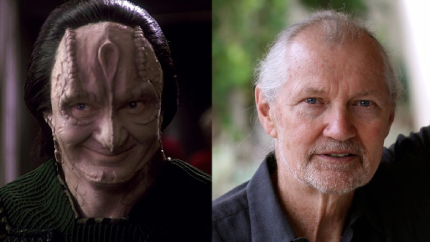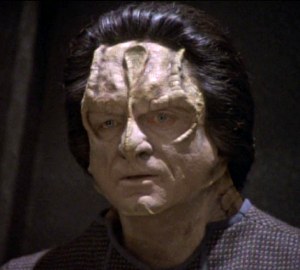“COVENANT”
“I’m a changed guy—honest! Check out my HALO!”
As far as I can remember, “Covenant” is the third Star Trek episode to explore the dynamics of cultism. The first was TNG’s dreadful “Descent, Part II”, which featured Lore as cult leader to a group of individualised Borg—and I’m still astonished as to what possessed the writers to think that would be a great idea. More successful was DS9’s “Paradise”, featuring Alixus, a kind of Luddite Margaret Thatcher who deliberately marooned her crew in the middle of nowhere in order to conduct a little social engineering. “Covenant” goes even further in its exploration of cult dynamics and, while it lacks subtlety, in some ways it’s absolutely inspired, because Dukat, Uber Space Narcissist, was simply BORN to be a cult leader. The man lives for adoration and is particularly obsessed with getting validation from Bajorans, so his little set up on Empok Nor was a stroke of genius on his part. I mean, we’ve never actually seen the man as happy as he is in the early parts of this episode. He’s positively glowing (although thankfully his eyes aren’t this time around). I suppose it helps that he once again has access to Bajoran women...
Of course, the success of this episode lives or dies on whether you can accept that a group of Bajorans—even Pah-wraith cultists—would ever, in a million years, accept the leader of the Occupation as some kind of messiah. I mean, we’ve seen how gullible Bajorans can be in the past. In “Accession”, they readily accepted the complete overhaul of society and the reintroduction of an archaic caste system,
no questions asked, simply because some dude claiming to be the Emissary decreed it. Yet, even, so—I was trying to figure out just HOW Dukat managed to create this cult in the first place. Did he set up some kind of extremist social media group and try to lure people in, only to reveal his true identity when he’d first managed to get them all to leave Bajor and set up home on Empok Nor? Did the Pah-wraiths perhaps send them visions, making them more liable to accept Dukat as their leader? It’s never explained, and the episode suffers for it. Vedek Fala’s justification for not believing in the Prophets was because of the horrors Bajor had to endure during the Occupation. That being so, why would he be so willing to place his faith in the very man who dished out those horrors?
Yet, you know what—? We live in a world in which a scary number of people actually see Donald Trump not as the swindling, self-serving malignant narcissist that he is—but as some kind of Jesus-like messiah who is here to save the world from evil. THAT, to me, is far more ridiculous than anything in this episode. The terrifying truth is that if you appeal to people’s emotions—specifically, their sense of lack or resentment—you can pretty much bypass all reasoning and get them to do or believe anything you want. That’s precisely what Dukat does here, and it’s scary to watch, because we’ve all seen this happen on a mass scale.
To a certain degree, “Covenant” is quite a successful, compelling episode. There is a touch of “Cultism 101” in that it leaves no cliche unturned; from Dukat’s impregnation of his followers to the grand Heaven’s Gate-esque mass suicide. It works, however, largely because it’s all so true to Dukat’s character. He does have a superficial charm and magnetism that would undoubtedly appeal to emotionally needy people. It’s tragic to see that his followers clearly aren’t bad people. They generally seem like decent, if deluded people, who simply want to believe in an authority figure who promises all the answers. Vedek Fala is an interesting character and although we don’t get into his psyche in any depth, we do watch him gradually catch onto Dukat’s lies. At first, he clearly wants to ignore the evidence staring him in the face and rationalise it away. Yet, the seed of doubt is planted, and eventually it becomes too much to ignore. His ultimate suicide ambiguous, although my suspicion is that he’s so broken by having been deluded by Dukat that he can’t go on living. When people who have been living in a mental fantasy find their worldview collapse like that, the resultant pain and cognitive dissonance must be devastating.
The interplay between Kira and Dukat is excellent, and Nana Visitor and Marc Alaimo are on top form. This is actually the last time we will ever see the two together, and it’s certainly a memorable final showdown, with Kira determined to bring Dukat down and expose him as a fraud. Of course, he is a fraud—but the fact we see him praying to the Pah-wraiths whilst alone indicates that he genuinely believes what he’s saying, and that perhaps the Pah-wraiths are guiding his actions in some way. This adds some welcome ambiguity back to the character following his descent into moustache-twirling cartoon villain in his previous couple of appearances. Thankfully there’s no fist-shaking “I’ll get you, Captain Benjamin Sisko!!” type melodrama here. Dukat is, for the most part, restrained and soft-spoken, which is actually far more unnerving than raving histrionics.
I do have a logistical problem with the episode. It’s strongly implied that it wasn’t until Dukat was “touched” by the Pah-wraith in “Tears of the Prophets” that he set up his little cult. However, that can’t have been more than six months ago at most. I don’t know how that gives Mika time to be impregnated and give birth to a child. We saw from Kira’s pregnancy that Bajoran gestation times are much the same as human ones—although I guess it’s possible that was changed by the fact Kira was carrying a human baby. At any rate, Dukat doesn’t wait around.
It’s fascinating seeing Dukat’s hold over his people unravel here as he tries to cover up his crimes by first attempting to murder the mother of his child (tip: if you’re on a space station, please NEVER accept an ominous invitation to meet someone is a Prophet-damned AIRLOCK!). When this doesn’t work, he resorts to mass murder, of course. This is standard Dukat: his ego is so fragile that he’d legitimately rather kill people than have them think bad of him. Again, Marc Alaimo is wonderful throughout and his performance is as earnest as ever. You really do get the sense that Dukat is the hero of his own story, and Alaimo is, as Ira Behr stated, convinced that he is the unsung hero of the series!
Ultimately, “Covenant” is a decent if unexceptional episode, perhaps just a little too constrained by cliche and predictability. It lacks a coherent arc for Kira, who doesn’t really change or learn anything by the end of the episode. Her scenes with Odo aren’t particularly good, with Odo slightly patronising in the opening scene (and I always think it’s funny when people say they don’t believe in the Prophets, given that they’re all that’s preventing the Dominion from overwhelming the Alpha Quadrant), and Kira a little smug. There’s a slight glibness to the discussions of faith and religion and the episode would have benefited from having more time to flesh out the characters of Fala and the others. As it is, things are painted in broad strokes and feel somewhat rushed. The closing scene also ends on something of a bum note, too similar to Sisko’s melodramatic proclamation of Dukat as “trooooly eeeevil” in “Waltz”. Nevertheless, the performances are on point, John Kretchmer’s directing is effective and the music and production are good, creating a nice sense of tension and atmosphere. The result is an interesting, compelling, yet uneven episode which never fully manages to transcend its cliches.
Rating: 7







